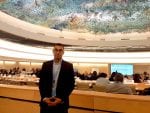
Negev Coexistence Forum for Civil Equality
פורום דו-קיום בנגב לשוויון אזרחי
منتدى التعايش السلمي في النقب من أجل المساواة المدنية
NCF is at the United Nations
21.03.2019
NCF’s Bedouin community representative to the UN CESCR: “The so-called development in the Negev/Naqab is done on our expense, we need the support of the international community”.
The statement was given on the 11th of March (Monday) during the pre-session of the CESCR Working Group. Following a report submitted by NCF and Adalah, which depicted the discrimination of the Bedouin community in the southern region of Israel. The Committee will convene to examine the implementation of the Covenant in Israel in September-October 2019. “Israel signed the Covenant and is obliged to implement its recommendations”.
As part of the shadow report submitted by the NGOs, they expressed their concern that the government is using “development plans” as a tool for dispossession and as a way to pressure the Bedouin population in the Negev/Naqab to move to the recognized villages and townships. Among the plans mentioned in the report are the expansion of Route 6, Industrial zone of Ramat Beka and the planned phosphate mine of Sdeh Barir – these plans will lead to the displacement of 36,000 Bedouin from their villages. The report also mentioned the severe neglect of the education and health systems, and the inability of the state to effectively promote Arab Bedouin employment. In addition, the organizations expressed concern with the government’s “development” plans that will lead to the displacement of 36,000 Bedouins from their villages, and severe budgetary neglect in the fields of education, health and employment, which causes huge gaps between Jews and Arabs in the Negev.
The organizations expressed strong reservations about the Five-Year Plan for Development (Government Resolution No. 2397), which they claim serves as pressure to evacuate the 35 villages that are denied recognition in the Negev/Naqab: “The residents of these villages are completely excluded from the budgets … The Plan includes an allocation of NIS 42 million to increase the enforcement of the Planning and Construction Laws in the Negev/Naqab, and another NIS 30 million to plant trees in the evacuated lands, in order to prevent the residents from returning to their homes.”
The pre-session of the Working Group, which took place in Geneva from 11-14 March, were part of the United Nations monitoring mechanism for the implementation of the UN Covenant on Cultural, Economic and Social Rights (1966), to which the State of Israel joined in 1992. Member States who signed the Covenant are committed to promise the protection of five central rights: the right to education, the right to health, the right to work, family rights and the right to adequate standard of living. The latter was discussed at length in the report due to the housing shortage and the policy of house demolitions against the Bedouin population in the Negev/Naqab, and included harsh criticism of the Authority for the Development and Settlement of the Bedouin in the Negev: “The Authority enters the villages in order to negotiate with the families, while the eviction itself is not even negotiable”, it said.
Speaking in-front of Committee Members, Amir Abo Qweder NCF’s representative to the UNOG, said: “This year, my brother ‘Akef’s house was demolished, his wife Amani and his little children Judah and Gina had to return to live with their grandmother to this day. They are still subjected to harassments and investigations by the Yoav Special Unit”. Abu Qweder himself is a resident of an unrecognized village a-Zarnug,, in which more than 5,000 people live, added: “Minister Uri Ariel is proud of dispossessing and evacuating tens of thousands of Bedouin from their villages,. He does not treat us as citizens, but rather as criminals! “
Tal Avrech, NCF’s international advocacy coordinator said: “The State of Israel deliberately and constantly chooses to ignore the Bedouin living in unrecognized villages. It prevents them from accessing their basic civil and human rights, in order to exhaust them so that they will align with the agenda it is trying to spread. Israel continues to ignore the Bedouin residing in unrecognized villages in both its internal and external surveys and reports, acting as if they just don’t exist. But they exist, and they are equal citizens of the state. NCF chose to write its report to the CESCR so that the voice of the Bedouin in the Negev/Naqab will echo in the hallways of the United Nations”.
For the Full Report Press Here
* This publication was produced with the financial support of the European Union. Its contents are the sole responsibility of Adalah and NCF and do not necessarily represent the views of the European Union.


 Youtube
Youtube
 Twitter
Twitter
 Facebook
Facebook